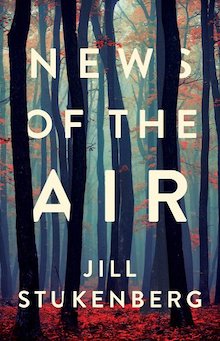
Black Lawrence Press, 2022
Jill Stukenberg’s debut News of the Air follows a family living in the Northwoods of Wisconsin in an eerily plausible climate disaster-affected future. The atmosphere is foreboding, and the area is increasingly deserted. Will Allie, Bud, and Cassie stay? It’s the suspense in this question—more accurately, this conflict—that drives the novel.
Allie Krane was pregnant with her first child when she and her husband Bud fled Chicago, a target of eco-terrorist attacks, to take over a seasonal fishing resort in a rural town. Nearly two decades later, the family has fixed the most desperate of the resort’s dilapidated structures, learned to create biodiesel for self-sufficiency as well as bartering, and forged connections with people nearby, even as more and more are abandoning their businesses and homes.
Although Allie and Bud initially agreed to make their home in the Northwoods, the couple no longer shares the same view on the best way forward. Bud sees the departures of their community members, and the closures of libraries, ice cream parlors and resorts like theirs, as signs that it’s time to go. Allie, on the other hand, hardens in her resolve that staying safe means staying put. This conflict is complicated by the fractured state of their marriage, evidenced most strongly by Bud’s affair with a woman who has since left. Allie and Bud make their decisions as transplants to the area, but that isn’t the case for their daughter, whom they occasionally overlook: “When they made fun of their local neighbors, they forgot Cassie was one of them.”
Stukenberg excels at subtly depicting Cassie’s intense yet distant relationship with her parents, particularly Allie. More resourceful than either of her parents, Cassie knows how to boat and swim on the lake, fix her old truck, and navigate the dense woods. Cassie is also more socially adept. She knows that joining the town’s orchestra is a way to make friends despite having been homeschooled, and she notices that there’s something off about several of the resort’s late-season visitors. Allie’s reaction to her daughter’s independence varies: although she is suspicious of Cassie and dismissive of her warnings, she admires her savvy. Stukenberg lingers on these reactions, giving the reader insight into Allie’s emotions and the background that has encouraged her to overlook her family’s caution and burrow away from society, retreating further into the woods.
This novel’s conflict hinges on the Northwoods setting and is reflected in it. “The woods were beautiful,” Stukenberg’s unnamed narrator states, “if a horrible kind of beautiful.” Descriptions of dense woods, ragged coastline, and the expanse of the lake serve as a wonderfully atmospheric backdrop to the human drama: who leaves, who stays, and why. Stukenberg lingers on the run-down cabins of the Kranes’ resort, the abandoned homes in the woods, the detritus of humans on the shore. This certainly highlights the negative impact people have on these surroundings, the waste and the wreckage. It also troubles the seclusion of the woods and the lake. The idyllic rural resort where the Kranes found refuge isn’t an untouched natural setting; it’s an area carelessly kept and abandoned by everyone who passes through.
Throughout the novel, most of the reasons why people leave are unsettling. Eco-terrorism prompts Bud and Allie to flee; others lose faith in the area’s failing institutions or tire of the harsh weather. But Stukenberg is careful to remind us that, even with the surrounding disaster, there is hope. Cassie, constantly the most perceptive, takes notice: “If young people were disappearing from the world—at least its rural places, its Midwestern places—there must have been other places they were arriving, where their numbers were increasing.” Leaving isn’t just fleeing from a place or a problem; it’s also moving toward the promise of something new.
“People needed their space,” Stukenberg writes as she sums up the claustrophobic comfort of the Krane’s tight family group: “It’s a thing you learned in a small cabin with three people, over months of winter, over years that stacked like plates. ” The Krane family does have visitors—town residents, customers, outsiders passing through. But the focus remains on Allie, Bud, and Cassie as they struggle to grow up together in a resort meant for week-long summer fishing trips. In News of the Air, Stukenberg explores where different people find space and solitude, and she unpacks the delicate balances of these relationships with the care and precision required to separate haphazardly stacked plates. The effect is a moving novel exploring perennial themes of belonging, escaping, and making a home.
+++
Jill Stukenberg‘s short stories have appeared in Midwestern Gothic, The Rupture, and other magazines. She is Associate Professor of English at University of Wisconsin Stevens Point at Wausau, where she lives with the poet Travis Brown and their eight-year-old.
+
Ceillie Clark-Keane is a writer based in Boston. Her work has been published by Electric Literature, Bustle, the Ploughshares blog, The Chicago Review of Books, and other outlets. She is a nonfiction reader for Salamander and Pangyrus.